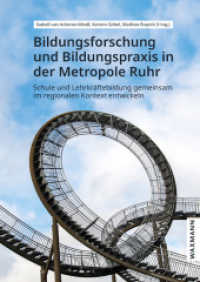- ホーム
- > 洋書
- > 英文書
- > Business / Economics
基本説明
New in paperback. Hardcover was published in 2005. The authors provide a guide to over 60 classic and contemporary readings. For each, they provide a synopsis, learning objectives, recommended questions, and discussion suggestions.
Full Description
Discussing Economics treats discussion - meaning formal consideration of questions about a reading - as a new approach to learning economics. Setting out a detailed approach modeled on the ideas of Mortimer Adler and the Great Books Foundation, the authors explain why instructors should organize discussion around interpretive questions, how to plan and lead discussion, and how to integrate it into a course. They then provide a guide to over 60 classic and contemporary readings that span much of the undergraduate economics curriculum. For each, they provide a synopsis, learning objectives, recommended questions, and discussion suggestions. The authors make the case for discussion as a productive, cost-effective pedagogy that provides students with the opportunity to improve their economic literacy. As students form and revise their interpretations, they use the concepts the authors used in ways that deepen their understanding, lengthen their retention and enable them to transfer their mastery to new contexts.
An invaluable resource for undergraduate and high school economics instructors, this volume will also be a useful tool for economic educators and those interested in classic economic writings.
Contents
Contents: Preface 1. Why Discussion Part I: Preparing for and Leading Discussion 2. Interpretive Questions 3. Question Clusters 4. Leading Discussion 5. Discussion Modules Part II: Discussing Economic Principles 6. The Wealth of Nations 7. Triumph of Capitalism 8. Transition Economics Part III: Discussing Macroeconomics 9. Monetary Policy 10. Unemployment and Inflation 11. Economic Growth 12. Deficits Part IV: Discussing Microeconomics 13. Thinking About Markets 14. Incentives and Markets 15. Labor Economics 16. Income Distribution 17. Whither Economics? Part V: Discussing Financial Economics 18. The Evolution of Money 19. The Theory of Interest 20. International Financial Institutions References Part VI: Appendix Index








